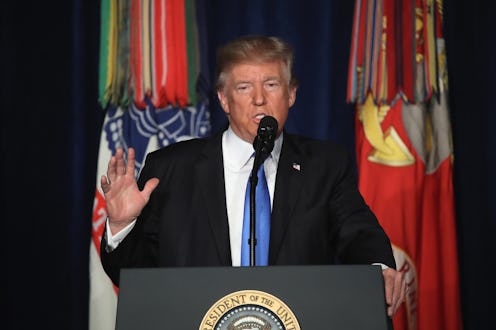News
Trump Supporters Were Not Happy About His Afghanistan Speech

President Trump's speech on Monday night addressed the country's continuing military role in the Middle East, but not in the way that many Trump supporters would have expected this time last year. Trump campaigned on an "America First" platform, with a plan to reverse the interventionist policies of the past few administrations, and put the government's focus on improvements at home. But after the speech, Trump supporters were left feeling like the president was pulling them into "unlimited war," as Breitbart briefly deemed it.
Trump has been very public about his views on U.S. involvement in Afghanistan. For years, he has called on the U.S. to withdraw from the Middle Eastern nation, calling the military operations there a "total disaster" and in 2013 tweeting "Do not allow our very stupid leaders to sign a deal that keeps us in Afghanistan through 2024."
His view was unwavering on the campaign trail, where he promised voters a president that would prioritize issues at home, rather than involving our troops with conflicts abroad. His base voted him into office based on that "America First" shtick, which he has now seemingly thrown out the window. His supporters are furious, but Trump seems unfazed that he is alienating his base.
Trump's speech was heavy on rhetoric and light on details -- not atypical of him, but somewhat unexpected when speaking about something as drastic as increasing the number of U.S. troops in Afghanistan. Reports ahead of the speech said the administration would call for an increase of 8,500 troops, but Trump offered no concrete numbers or timeline for deployment, instead saying that strategy would be dictated by the "conditions on the ground, not arbitrary timetables."
There have allegedly been warring factions within the White House when it comes to our military actions abroad. Trump has brought many military men into advisory positions, who reportedly urged the president to take this action to increase troop numbers in Afghanistan. His Washington outsider advisers, however, are more aligned with Trump's base, and urged him to stay on an anti-interventionist path. It's clear who won that battle, and those on the losing side, like Steve Bannon, were quick to express their disappointment in the most extreme terms.
Bannon left the White House last week and returned to Breitbart, the conservative media outlet which one could say best encapsulates the general opinion of Trump's base of supporters. Breitbart unleashed a flurry of condescending headlines regarding the president's changing strategy immediately following Monday night's speech. Brietbart stories compared Trump to Obama (obviously the ultimate dig in far-right circles), said he flip-flopped and angered his base, and said that Trump was succumbing to the guidance of his military advisers, rather than staying true to the "America First" vision that got him elected.
And it's not only Afghanistan. The U.S. has expanded military operations in five other Middle Eastern nations since Trump became commander in chief, and he seems willing to go toe-to-toe with North Korea as well. In his speech, he rationalized the increased involvement in Afghanistan by saying, "we are not nation-building again, we are killing terrorists." But it doesn't seem that his supporters are buying it.
So what does this tell us about the direction Trump will be taking his administration? One may say that he is abandoning the desires of the people who got him elected, that he is not staying true to his word, and that he doesn't seem to care about the potentially irreparable harm he is doing among his supporters.
But Trump claimed that it was the weight of the highest office that changed his mind on the Afghanistan situation. So another way to look at it is that he is beginning to understand that he has advisers for a reason. That there are people around him with extensive knowledge on certain subjects that he does not have; which is the reason a president entertains their counsel. That he is realizing things that can only be realized once you sit in the Oval Office, things that his former self, tweeting from the Central Park view of Trump Tower couldn't have been privy to.
Those who supported Trump for his "America First" platform are no doubt angered by the president's speech on Monday. And not to give him too much credit, because Trump's actions still remain far from what should be acceptable for a president, but perhaps his willingness to change direction indicates a potential for reason above unwavering fealty to a platform position.